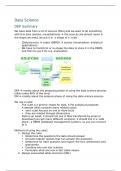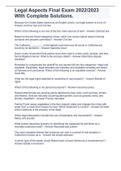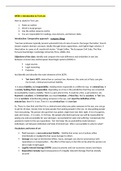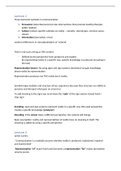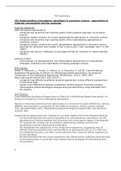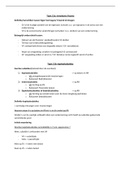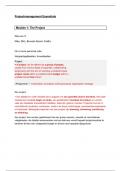Organization, Ninth Edition K
bank
,1. Excellence is defined as ?safe, effective, patient-centered, timely, efficient, and equitable.? A new
associate asks you why ?safe? is first. You reply:
a. ?Because it has a long tradition. Hippocrates said ?First, do no harm.? 2,000 years ago. It?s also
consistent with ?Do unto others.??
b. ?Because people come to healthcare with troubles and limitations, and they trust us to help, not
harm.?
c. ?Because accrediting and regulatory stakeholders expect safety.?
*d. All of the above
2. You are meeting a group of new associates joining your well-managed HCO. You show them the
mission on the HCO?s website and say, ?Our mission is very real to us. It?s...?
a. ?...what we say we are to patients.?
*b. ?...a public declaration of intentions?why we?re here.?
c. ?...a summary of shared objectives among competing stakeholders.?
d. ?...a way to focus everybody?s best effort.?
3. Why is a values statement important? Like the mission, many associates will assume that it?s
window dressing. What does leadership need to say? ?We?re serious about our values, and they
are important because...?
a. ?...they are a foundation for working together.?
b. ?...they establish basic expectations about conduct.?
c. ?...they create a more comfortable workplace.?
,*d. All of the above
4. In your internship, one of the younger people on the senior leadership team reflects, ?You know
that, when you?re a leader, any associate or patient comment should get a constructive response.
When I started, I had a lot of trouble understanding what ?constructive response? means. What do
you think that term means?? You reply, ?I think it means...?
a. ?...solving the problem raised if you can and promising to work on it if you can?t.?
b. ?...explaining how the HCO has many problems, so it can only work on important ones.?
c. ?...trying to make the asker happy.?
*d. ?...solving the problem raised if you can and accepting it as an OFI if you can?t.?
5. WMHO defines stakeholders as having ?a direct interest in an organization?s success.? A PIT
studying a not-for-profit HCO?s mission wants to know, ?Are some stakeholders more important
than others? Can we give priority to the interests of some group of stakeholders at the expense of
others shown in exhibit 1.3?? You reply:
a. ?Patients come first, but any unhappy stakeholder group will hamper the ability to deliver
SEPTEE care.?
b. ?If we meet our existing contracts, we can give priority to any stakeholder group.?
*c. ?They all have equal rights. If their ?direct interests? are not met, any stakeholder group can
close us down.?
d. ?Giving any group except patients a priority might be illegal.?
, 6. At many excellent HCOs, the CEO reviews the mission with all new hires. When you?re hired as
a young manager, you attend with all the other hires. At the coffee break, you hear one new hire
say, ?The boss really put emphasis on the mission and stuff. I wonder if he really means it.? What is
your best comment?
a. ?He probably wouldn?t take time to talk with us if he didn?t think it was important.?
b. ?Yeah. A lot places, it?s just window dressing.?
*c. ?I?m pretty sure he does. You could ask coworkers on your team.?
d. Say nothing. It?s not your concern.
7. You want to describe evidence-based management (EBM) to a group of civic leaders. Which of
the following would you start with?
a. ?EBM has led us to formal process specification.?
b. ?EBM relies heavily on performance measurement.?
*c. ?EBM replaces authority and opinion with fact.?
d. ?EBM is the cheapest way to get the job done.?
8. A curious associate asks, ?Who owns our HCO?? It?s a nonreligious not-for-profit that is a
subsidiary of a larger system with many HCOs (like Sharp, Henry Ford, or Sutter Health). You
respond, ?The individual HCOs are owned by??
*a. ??the communities they serve.?
b. ?? our overall corporate system.?
c. ??the trustees of our overall corporate system.?

